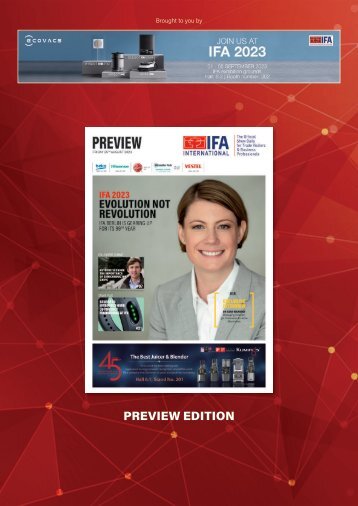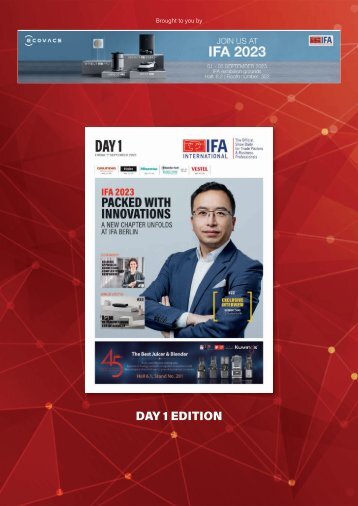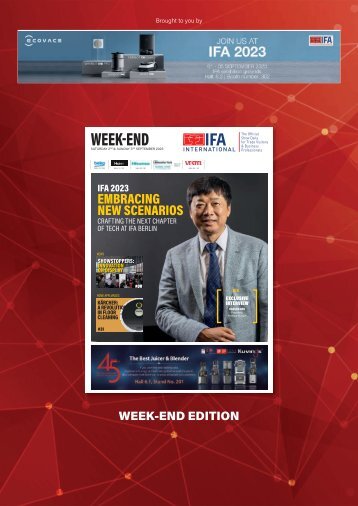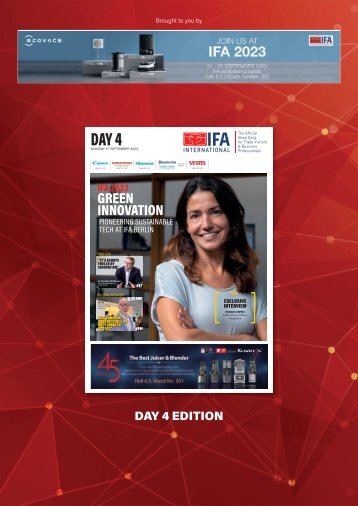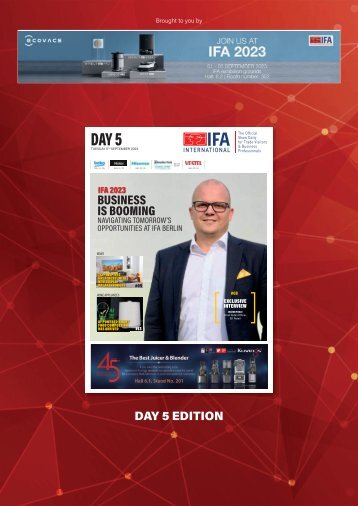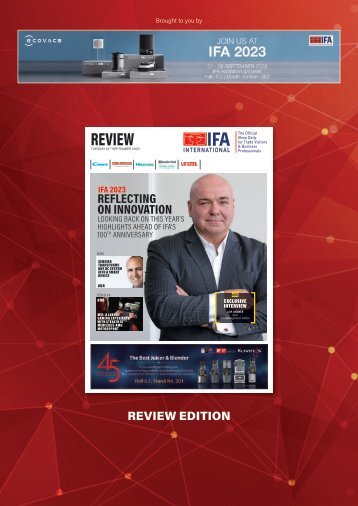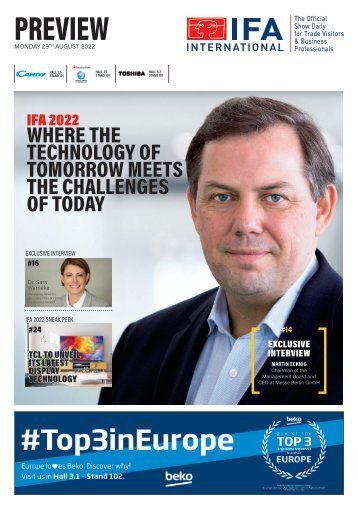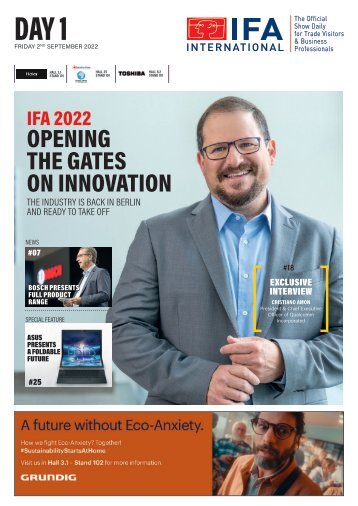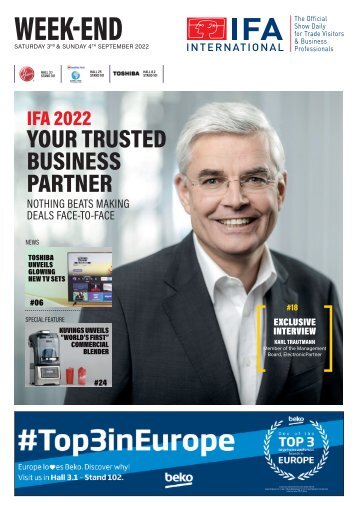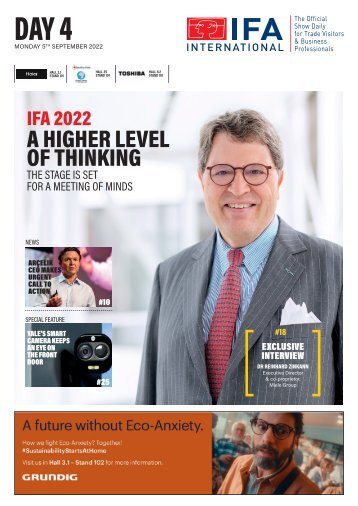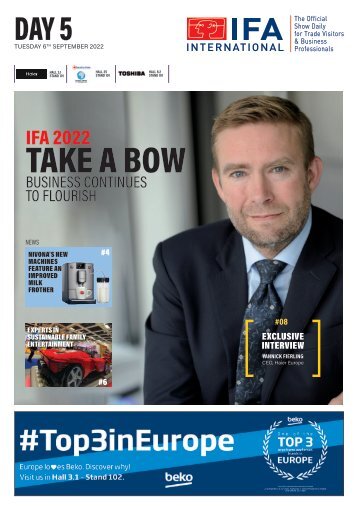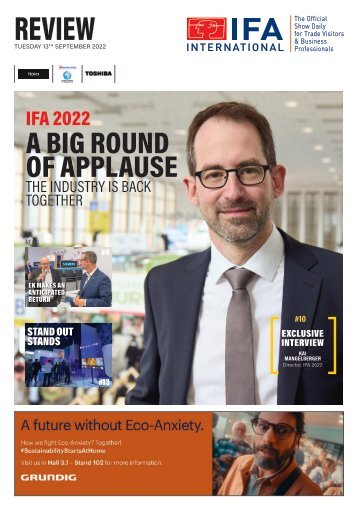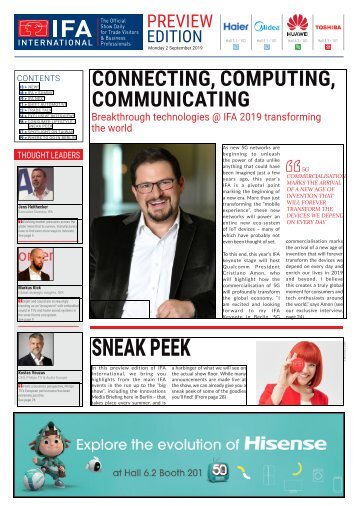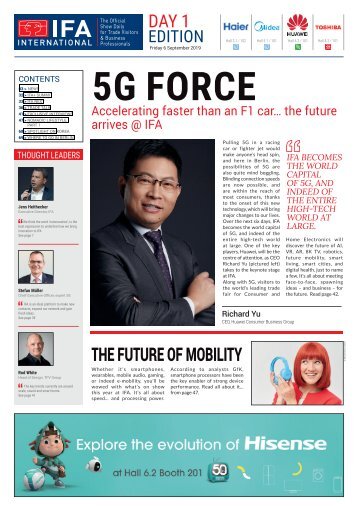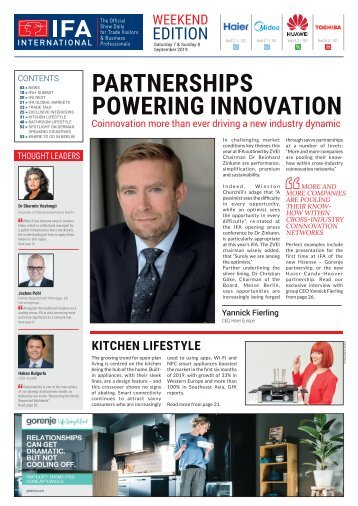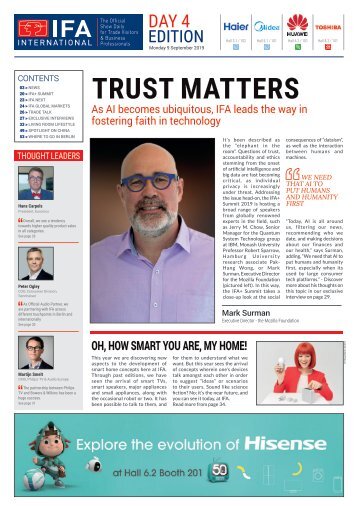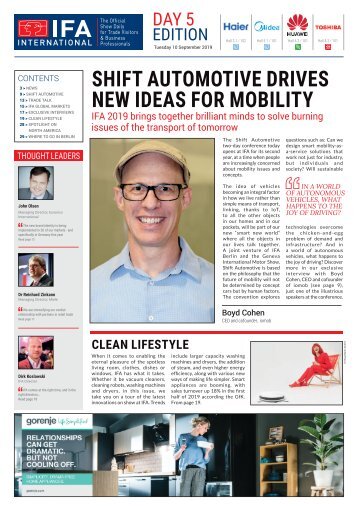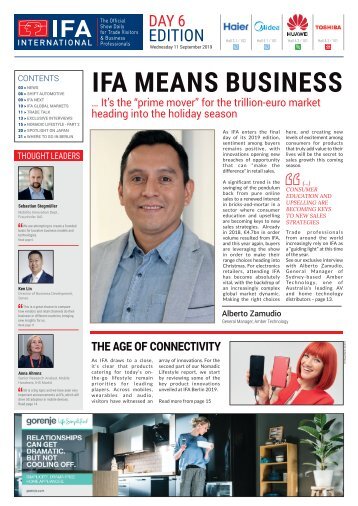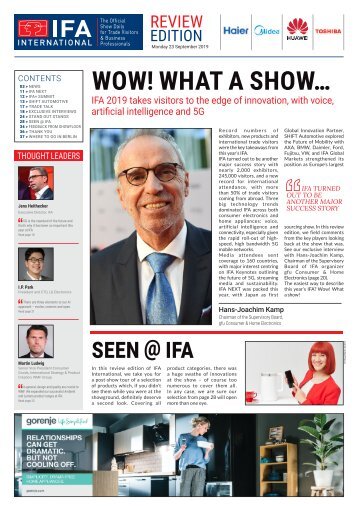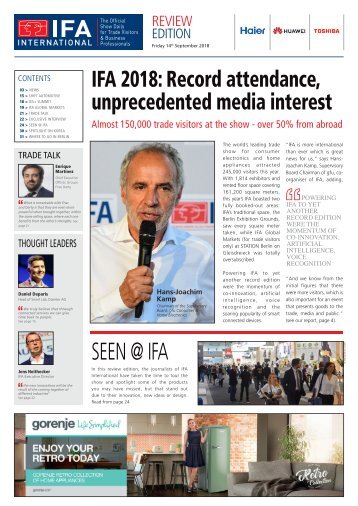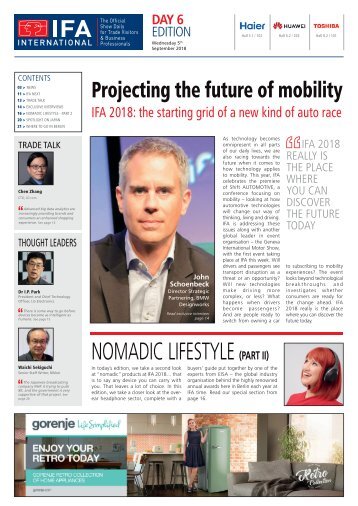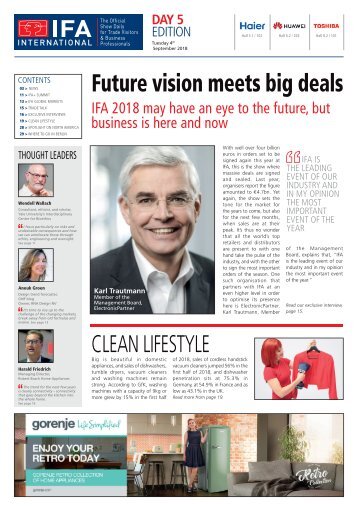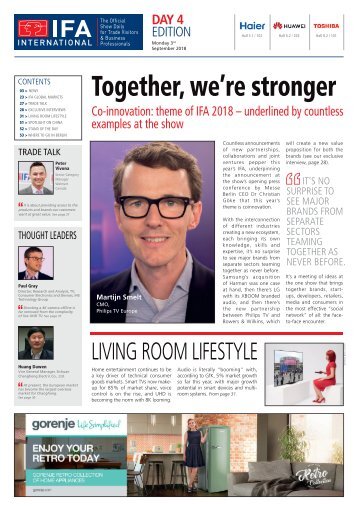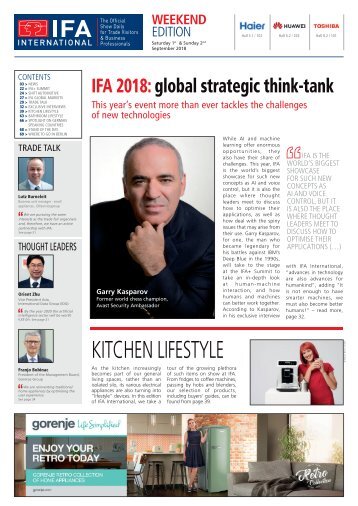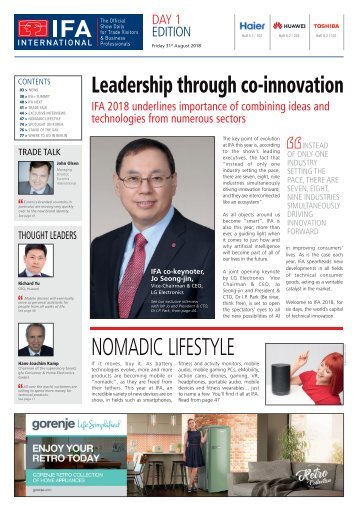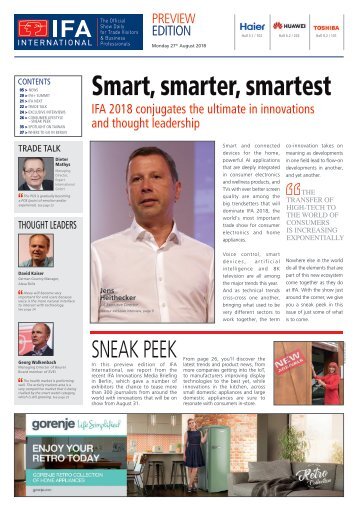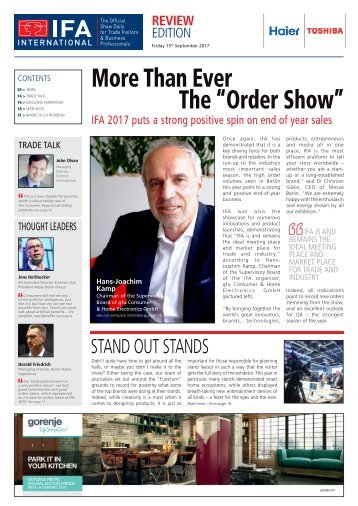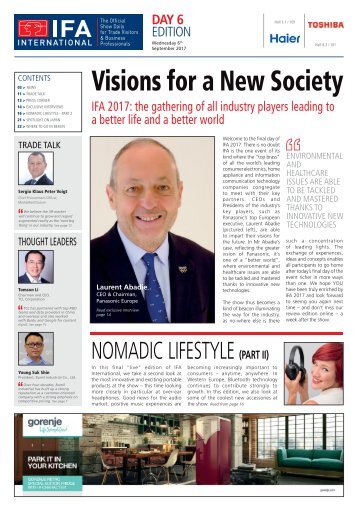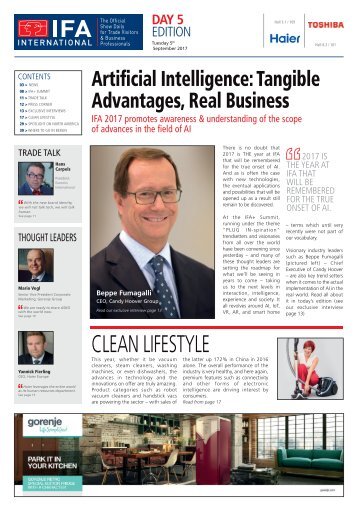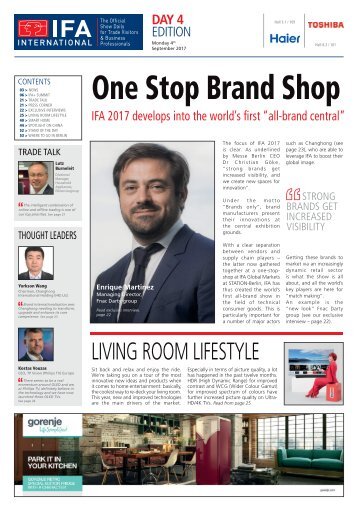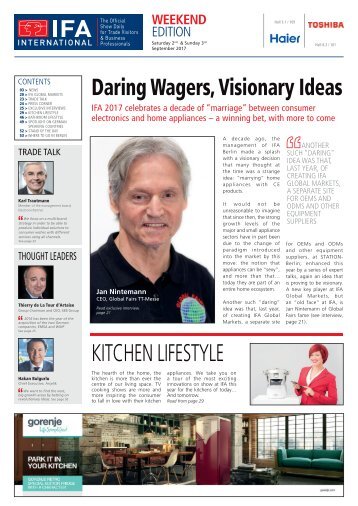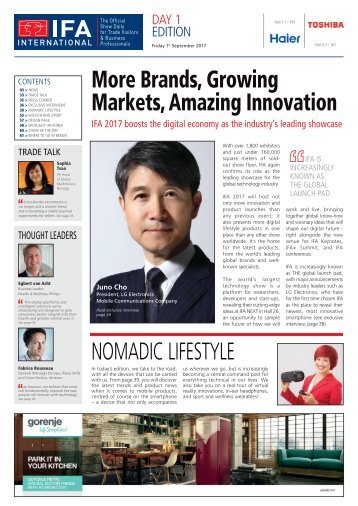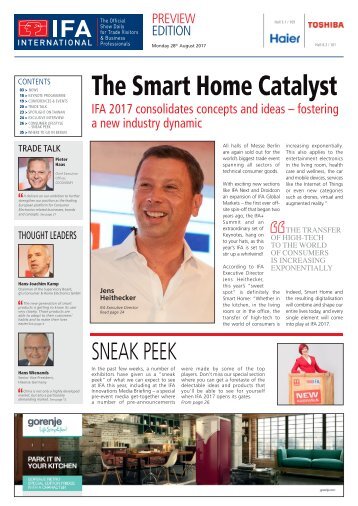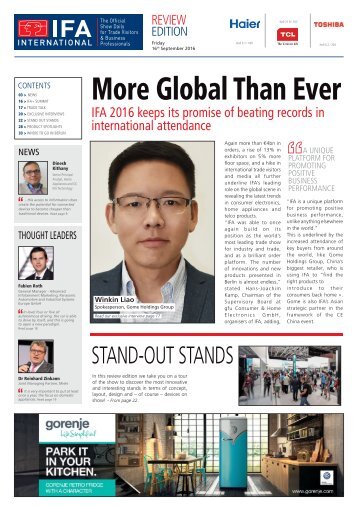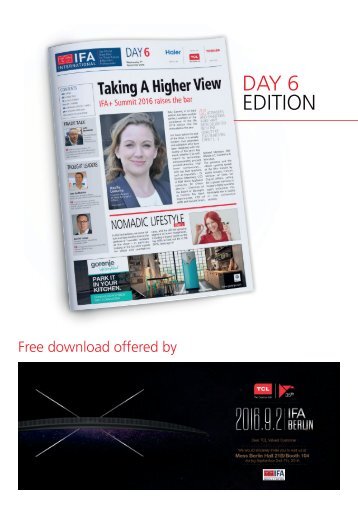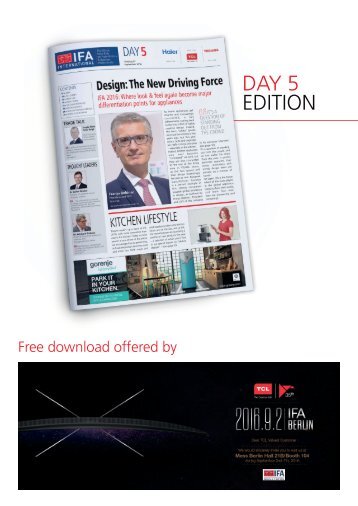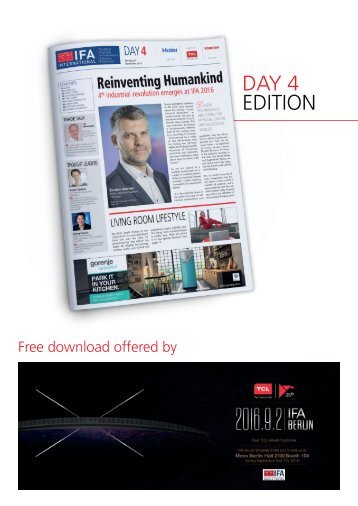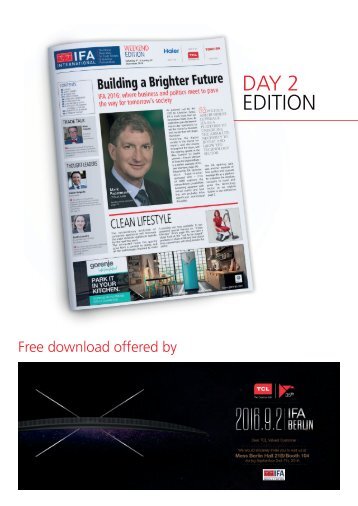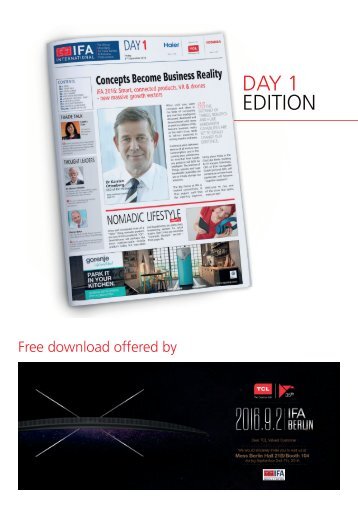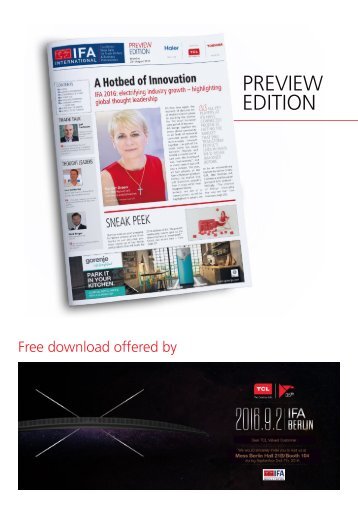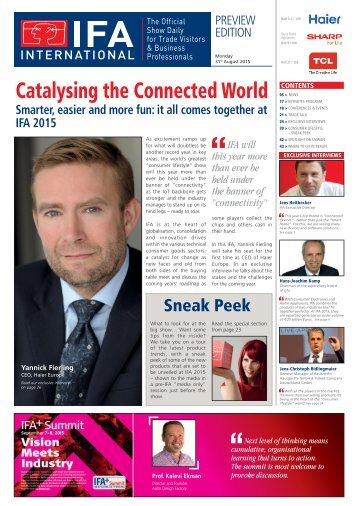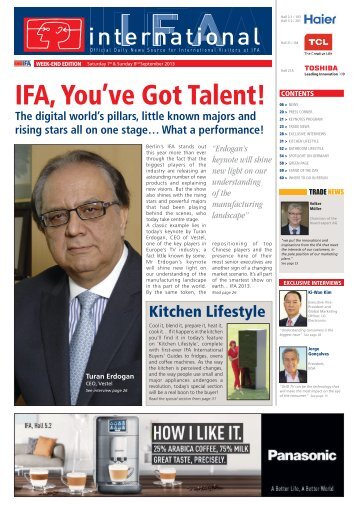
Preview Edition - IFA International
- Text
- Products
- Berlin
- Consumers
- Consumer
- Marketing
- Global
- Trends
- Innovation
- September
- Electronics
- Www.cleverdis.com
Sustainable Development
Sustainable Development Initiatives a G r e e n I n n o v a t i o n Company. And finally, as we carry out management, we will continue to pursue activities that will protect and give due respect to the environment. And such efforts will surely lead to our own growth. This is our vision as a Green Innovation Company. Does this also mean that we have to seek innovation in all of our business fields and in all of our divisions, while making the environment central to our activities? Ye s . W e m u s t s e e k innovation in this way in all aspects of our work including product development, manufacturing, not to m e n t i o n , m a r k e t i n g . What is more, if Panasonic e m p l o y e e s a r e a l s o i n n o v a t i v e r e g a r d i n g business trips and holding meetings, it can have a good effect on the environment. As a Green Innovation Company, all of us must work hard to establish a business-style that helps to make this ideal goal a reality. We are now working on many initiatives involving Green Life Innovation and Green Business Innovation. I believe that this is a new direction we should take, and go forward on a global scale. Words like “Green Innovation” may sound new today, but in 2018, when we celebrate our 100th anniversary, such words will surely sound very familiar to everyone. I will be more than happy if people at that time look back and remember Panasonic as a company which proposed such ideas and actually put them into practice in their daily corporate activities. Konosuke Matsushita, our founder, led our company to growth through endless innovation. What can we still learn from him today? His whole life, up to the age of 94, was taken up with constant innovation. I believe that he brought forth great innovation at a major turning point in history. He often set an example for the entire industry. Many of his innovations were the result of his sincere desire to make a contribution to society. At the management policy meeting in 1960, he announced that he would introduce a fiveday workweek, in five years, starting in 1965. He had already learned from visiting the US that a five-day workweek had become common practice there. However, the five-day workweek was still very rare in companies in Europe, and unimaginable for ordinary companies in Japan. Still, our founder knew that, sooner or later, his company was going to be competing with American companies in the global market. As he was determined to compete successfully with American companies, he thought it was necessary to have two days off a week, one day for rest and the other day for cultural activities. He believed that this change would improve his company’s competitiveness and the efficiency of his employees. With this firm commitment, he decided to introduce a five-day workweek. If you study our corporate history, you will learn that this decision raised various concerns. In those days, the standard workweek was 48 hours. Would the company be able to improve (…) the 20th century was the century of the IT revolution, and the 21st century is the century of the environmental revolution. (…) - cost competitiveness if the workweek was cut by as much as eight hours? Would labor efficiency really improve? Despite such doubts, our founder decided to introduce the five-day workweek, based on his vision of what the company needed to do to get ready for the coming age of global competition. I joined Panasonic in 1971. I didn't know of any other company that had announced the full implementation of a five-day workweek, although I read through a lot of recruiting information provided by many other companies. Panasonic was the only company that gave its employees two days off a week. I was impressed by the way the company explained the importance of having this time off, one day for rest and one day for cultural activities. This was the purpose of having a five-day workweek. I still clearly remember how impressed I was by this idea. Our founder kept his word and introduced the five-day workweek in 1965. Come to think of it, that was the year following the Atami Conference, such a significant conference in our corporate history. He kept his promise as originally announced. And any worries turned out to be groundless. Quite contrary to the original concerns, our cost competitiveness and efficiency continued to substantially improve. Corporate management also continued to show significant progress. I believe that this is what innovation is all about. Now we have SANYO Electric as a Panasonic Group company. Could you give us your comments about this from the viewpoint of innovation? As you know, Toshio Iue, the founder of SANYO Electric, was working with Konosuke Matsushita at the time Panasonic was established, and we respect him as one of the great contributors to the company in the early days. And now SANYO, the company founded by Mr. Toshio Iue, and Panasonic, have begun working together. I see history being made in our new partnership with SANYO. I am very happy about this. Panasonic is engaged in manufacturing a wide variety of products for consumers. SANYO excels in photovoltaic cells and lithium-ion batteries, and also in commercial equipment and devices. Therefore, our partnership with SANYO allows us to provide comprehensive energy solutions for the entire home and the entire building. As good partners, Panasonic and SANYO will seek to maximize our synergy. The unique strengths of our respective companies will produce this synergy, ensuring the success of our corporate management, business expansion and product development. This is the kind of innovation that both of our companies aim to bring forth through our partnership. Panasonic and SANYO are very big companies. If we fail to generate synergy and produce tangible results in business, the partnership will simply make the organization too large to sustain. This could lead the organization to collapse. We will either have success or collapse. Of course, we will not collapse. I don't believe that will ever happen. I have great expectations for the synergy and innovation which will be produced through our partnership. 36
Special Feature BSH lays the cornerstone for the future in Berlin New technology centre for laundry care protects jobs In addition to research and development, BSH's new development centre for laundry care in Berlin will house its quality management, production and materials planning and purchasing activities along with other departments involved in the development of future washing machine and dryer models. The facility will consolidate large portions of the company's knowhow in this product segment. BSH currently produces washing machines and dryers in plants in Berlin and Nauen (Brandenburg) as well as in China, Poland, Spain, Thailand, Turkey and the USA. The six-story building with 32,000 square meters of floor space in Siemens' Technopark features a modern design and a direct link between offices and laboratories. Each level in the communication-friendly building has a central lab area that is closely linked to offices in the facility's six wings. The facility was also designed in accordance with the "Green Building" concept and features innovative and regenerative building technology. For example, the roughly 1,000 washing machines and dryers which often run around the clock in the various labs are operated with green electricity. In the winter months, their warm water and air output will be used to heat the building, while a ventilation system equipped with cooling Feature BSH Bosch und Siemens Hausgeräte GmbH this summer laid the cornerstone for its new technology centre for laundry care in Berlin. Starting as early as next year, the company will use the new site to plan and develop washing machines and dryers for its manufacturing plants. BSH currently employs about 550 employees in its laundry care development and other service operations at its old location in Berlin-Gartenfeld. As early as next year they will move to the new building in Siemens' Technopark Berlin, which will provide a top-class work environment for all employees. The total investment volume for the new technology centre is roughly 50 million euros. New Building towers will cool the testing facilities in the summer. The state-of-the-art heating and cooling systems will save almost 300,000 euros and more than 1,500 tons of carbon dioxide (CO 2 ) per year. Along with the move to the new building, BSH also plans to intensify its cooperation with Berlin's universities and scientific institutions. The company plans to set up joint research projects to develop new technologies and innovative applications for the washing machines and dryers of the future. During the cornerstone ceremony, Chief Technology Officer Winfried Seitz placed great emphasis on the 'transition from a historical production site to a futureoriented development site", which BSH is currently Cambridge Consultants executing in Berlin. Seitz continued: “We have to create the right conditions today to make sure that we remain a leader in innovation tomorrow. That's why the technology center for laundry care represents a critical investment in the future of BSH." The new research and development center is being built on BSH's behalf by project developer Technologiepark Berlin GmbH & Co. KG, a subsidiary of Paribus Real Estate GmbH, Hamburg, and Deutsche Realcorp (DRC) GmbH & Co. KG, Berlin. BSH has signed a 15-year lease deal with the developer. ideasintoreality Product developers face a green revolution brought on by new eco-legislation and consumer demand. Building eco-criteria into product development is complex, it’s hard and it’s going to require revolutionary not evolutionary technical innovations. Cambridge Consultants has been developing successful breakthrough products for clients for 50 years and has developed its own eco-innovation processes to help clients leapfrog the competition. If you want to learn how to create commercially viable products which delight the user and fit these new green requirements, come along to one of our Eco-Innovation workshops: Hall 11.1, Stand 1 Friday 3rd September 2010 at 11-12.30 am or 3-4.30pm Monday 6th September at 11-12.30 am or 3-4.30pm To register contact Rachel Harker on: leapfrogging@cambridgeconsultants.com or phone +44 (0)1223 392453 www.CambridgeConsultants.com www.ifa-international.org IFA International • Monday, 30 th August 2010 37
- Page 1 and 2: preview edition international O f f
- Page 3 and 4: News Powering Upwards and Onwards M
- Page 5: News players are doing very well. T
- Page 9: O f f i c i a l D a i l y V i d e o
- Page 12 and 13: Conference & Event Preview IFA Pres
- Page 14 and 15: A well-informed buyer is less likel
- Page 16 and 17: 16
- Page 18 and 19: A well-informed buyer is also more
- Page 20 and 21: Product Trends LOEWE So… Individu
- Page 22 and 23: Get ready for the trip of your life
- Page 24 and 25: Product Trends Hama: “The Smart S
- Page 26 and 27: Product Trends TOSHIBA - LIBRETTO M
- Page 28 and 29: HALL PLAN Hall 1.1 - Stand 201 Hall
- Page 30 and 31: www.ifa-international.org IFA Inter
- Page 32 and 33: We give buyers the kinds of multi-m
- Page 34 and 35: Siemens i-Dos. A world’s first. T
- Page 36 and 37: Product Trends “A Highly Trusted
- Page 38 and 39: SWITCH ON START SAVING Philips Ener
- Page 42 and 43: IFA DisplaySearch Business Conferen
- Page 45 and 46: The Diary of Miss IFA Behind the Sc
- Page 47 and 48: Xxxxxxxx xxxxxxxxxx HOTELS / BARS /
- Page 49 and 50: Xxxxxxxx xxxxxxxxxx Where to goin b
Inappropriate
Loading...
Mail this publication
Loading...
Embed
Loading...

IFA International
- IFA International 2023
- IFA International 2022
- IFA International 2020
- IFA International 2019
- IFA International 2018
- IFA International 2017
- IFA International 2016
- IFA International 2015
- IFA International 2014
- IFA International 2013
- IFA International 2012
- IFA International 2011
- IFA International 2010
- IFA International 2009
- IFA International 2008
- IFA International 2007
